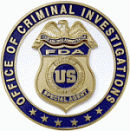Inspections, Compliance, Enforcement, and Criminal Investigations
July 27, 2009: Massachusetts Resident Sentenced for Nationwide Internet Prescription Drug Scheme
|
U.S. Department of Justice Press Release
|
|---|
For Immediate Release July 27, 2009 | United States Attorney District of New Hampshire Michael J. Gunnison Acting United States Attorney Mark Irish Assistant U.S. Attorney (603) 225-1552 |
|---|
CONCORD, NEW HAMPSHIRE: Today, Christopher Chase, age 27, of Lynn, MA, was sentenced to 42 months imprisonment and three years of supervised release during a hearing before U.S. District Judge Paul J. Barbadoro. On February 25, 2009, Chase entered a plea of guilty to a two count indictment charging him and two co-defendants with conspiracy and money laundering. The indictment alleged that the defendant conspired to smuggle and illegally distribute anabolic steroids, human growth hormone (“HGH”), insulin-like growth factor (“IGF-1"), and clenbuterol. The indictment also alleged that Chase laundered money by sending it to various foreign countries including China and Moldova. The substances alleged in the indictment are illegal prescription drugs which were manufactured abroad, primarily in China, as well as other foreign countries. HGH and IGF-1 are injectable drugs and some forms of the anabolic steroids were also injectable. The indictment alleged Chase and two co-defendants illegally imported the aforementioned prescription drugs and introduced them into interstate commerce without the prescription of a licensed medical doctor or other licensed medical professional. Many of the packages which were shipped into the United States contained the prescription drugs but falsely declared that the packages contained test tube samples, mold samples, glass samples, measuring cups and glassware. The prescription drugs did not bear adequate directions for use in that the labeling did not contain directions under which a layperson could use the drugs safely and for their intended uses. All of the drugs sold by the defendant were sold without a prescription and were nevertheless distributed despite the obvious dangers associated with unsupervised use of prescription drugs. Moreover, none of the drugs were approved by the Food and Drug Administration as safe or effective for body-building, the use for which the defendant marketed the drugs. Anabolic steroids are Schedule III controlled substances and are not FDA-approved for body-building. HGH is not approved by the FDA for body-building and may only be lawfully distributed for the treatment of disease or other recognized medical conditions as authorized by the FDA. Clenbuterol is not approved by the FDA for any use in humans, and IGF is not approved by FDA for any adult use. The defendant nevertheless sold these drugs to customers throughout the United States for a use for which the drugs had not been determined by the FDA to be safe and effective. Moreover, the defendant obtained the drugs from foreign sources with no assurance that the drugs were manufactured under sanitary conditions or that the drugs were what they were purported to be. The FDA approval process is not limited to a clinical review; it includes a review of the manufacturing process and the drug's chemical composition, labeling, and packaging. The drugs sold by the defendant originated in countries such as China, Turkey, Poland, and Romania and were not subject to the FDA's comprehensive review. Thus, the defendant not only sold the prescription drugs to customers who lacked a prescription and for a use not approved by the FDA, he sold drugs manufactured and packaged under unknown conditions. Once the prescription drugs entered the United States, they were distributed over the internet through websites and customers paid for the prescription drugs using credit cards and cash payments sent through the mail or by Western Union, MoneyGram, Pay Pal and PayByCheck. Most of the prescription drugs were paid for by credit card from customers in New Hampshire and throughout the United States. To enable the customers to pay for the illegally distributed prescription drugs, defendant Chase obtained 20 merchant accounts in his own name and also in the names of the other participants in the scheme. Between December 1, 2005, and September 30, 2006, Chase mailed approximately 520 packages within the United States and abroad. Chase represented to the banks that the merchant bank accounts were intended for legitimate merchandise rather than for the illegal sale of prescription drugs. In this regard, Chase created decoy websites that falsely purported to sell legitimate merchandise and provided the names of these decoy websites to some of the banks. Chase used the merchant bank accounts to sell the prescription drugs through websites that were not disclosed to the banks. Using the merchant bank accounts, credit card sales in the amount of approximately $671,465 were processed and electronically transferred to eleven bank accounts belonging to Chase and other participants in the scheme. Thereafter, approximately $549,047 was withdrawn, $425,890 of which was wire transferred overseas at Chase’s direction. The aforementioned totals do not include the revenues that Chase generated from selling anabolic steroids in the United States, an amount that remains undetermined. This case was investigated by the Office of Criminal Investigations of the Food and Drug Administration, U.S. Immigration and Customs Enforcement, the U.S. Postal Inspection Service, and the Internal Revenue Service, Criminal Investigations. The case was prosecuted by Special Assistant U.S. Attorney Sarah Hawkins and Assistant U.S. Attorney Mark Irish. # # #
|








